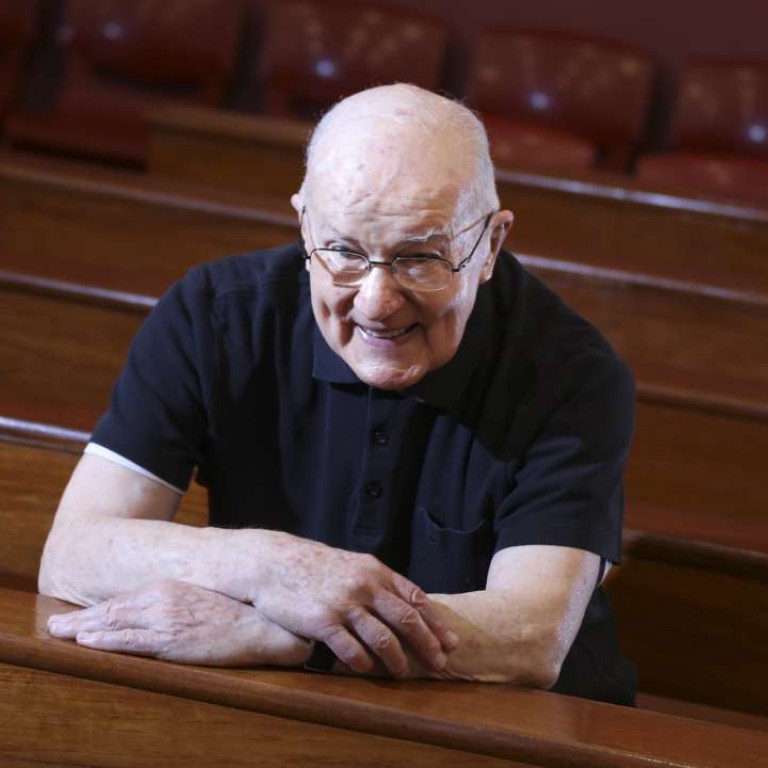
Former head of elite Hong Kong school defends U-turn on funding
Ex-principal says switch to new funding model will enable Wah Yan College to control pupil intake
An influential figure behind the prestigious Wah Yan College in Wan Chai has defended its move towards semi-independent funding status, saying it will give it more flexibility to take in students of its choice – including those from poorer backgrounds and with better grades.
While Father Alfred Deignan, the former principal of both Wah Yan Colleges in Hong Kong Island and Kowloon, had previously attacked the scheme for only catering to the rich, in an interview with the Post, he said that after reflection the school management was more inclined towards making the switch.

“Our school is actually becoming a school for the rich. That wasn’t the road we wanted to go,” he said.
By switching to DSS, the school would have more say in choosing students, such as increasing the intake of less well-off students through scholarships and financial aid.
Introduced in 1991, the Direct Subsidy Scheme gives schools greater autonomy in management, deployment of resources and curriculum design.
Schools can admit their own students and collect fees in addition to government assistance, with some charging steep sums.
As such these institutions have been seen as a rich man’s game, with many parents who can afford the high fees opting for these more autonomous schools instead of public ones.
Diocesan Boys’ School and St Paul’s Co-educational College, both high-end schools that converted to the model, charge students HK$45,900 and HK$55,000 per year respectively for the Diploma of Secondary Education.
However, the Education Bureau stipulates that if the fees exceed two-and-a-third times the average unit cost of an aided school place, government funding will cease.
Aided schools, by contrast, do not charge fees. They can select no more than 30 per cent of incoming Form One pupils based on their educational philosophy and characteristics, with the remainder coming from the central allocation system, which is mainly based on the school’s geographical net.
Deignan noted that Wan Chai was the richest area in Hong Kong. He also pointed out that not all DSS schools charged high fees, with some even offering free education. Several Delia Memorial School branches in Kwun Tong and Mei Foo do not charge fees for Form One to Three.
Wah Yan Hong Kong previously said the Jesuit Education Board had laid down some parameters regarding the possible transition to DSS, including charging fees of HK$20,000 or less per year.
Deignan added that converting into a DSS school would also allow Wah Yan to take in only top pupils.
We may be have to become a Chinese-medium school if [students] don’t reach [a certain] level of English
As Wah Yan is an aided school that is affiliated to Pun U Association Wah Yan Primary School, it has to dedicate 85 per cent – 79 students – of its central allocation places to the primary school with grades in band two (the second highest) and above. The other 15 per cent of central allocation places are for those living in the Wan Chai school net.
“In accepting so many students [from Pun U Association Wah Yan Primary School], how many of those are band one [students]? Not many,” he said.
“[By] accepting band two students, the standard is going to go down. We may be have to become a Chinese-medium school if [students] don’t reach [a certain] level of English.”
He said this would be a disaster and predicted half the student population would leave should this happen.
But he stressed that even if Wah Yan Hong Kong became a DSS school, it would still keep the affiliation with the primary school but not necessarily accept 79 students, but perhaps only band one students.
According to its website, the primary school is considering the switch to the DSS.
Wah Yan Hong Kong began consultations this month. Stakeholders including teachers, students, alumni, parents and members of Pun U Association Wah Yan Primary School and Wah Yan One Family Foundation are expected to be involved in the process.


